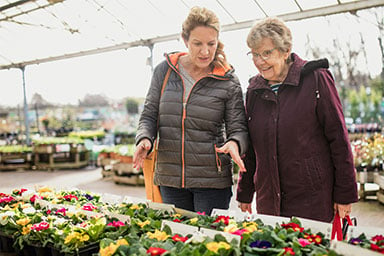
Though many of us tend to adopt a complacent lifestyle later in life, there are endless opportunities to stimulate our minds and improve our overall well-being. In fact, the more you can challenge your mind, the younger you may begin to feel. Neurosurgeon and CNN Chief Medical Correspondent Sanjay Gupta, MD reports that “the brain remains plastic throughout life and can rewire itself in response to your experiences”. Regular mental workouts create new neurons and neural connections – a process called neuroplasticity – and can slow or prevent cognitive decline.
Neuroplasticity is a big word, but it’s not as complicated as one might think. While imagining your brain doing sit-ups and lifting weights is one way to spend your time, it’s not really what we mean by a “mental workout”. Rather, a mental workout is engaging with new skills, challenging your brain to make new connections. In 2019, a study done by the University of California- Riverside found that participants aged 58-86 who took classes such as Spanish, photography, and painting scored just as well as middle-aged adults on cognitive tests and reported feeling reengaged and more capable of learning than they had years prior.
So let’s engage our minds! To help you begin, below are 5 activities that you can pick up at any level, or age for that matter, to keep your brain humming well into your later years of life.
PRACTICE YOGA
The mind-body connection that yoga fosters can benefit anyone, no matter their age or skill level. The most well-known practice is Hatha yoga. Hatha yoga encompasses meditation, breathing techniques, and holding an array of challenging postures, which can be modified depending on what’s comfortable for individuals living with limited mobility. This type of yoga has proven to help older adults with speed and accuracy in tests surrounding mental recall. Not only does yoga sharpen your mind, but it also carves out space for you to explore the capabilities of your physical body. Whether it be challenging postures, holding extended stretches, or simply laying still on your mat, the 90 minutes dedicated to your practice will leave you feeling refreshed both physically and mentally.
Community is one of the most important factors to consider when practicing yoga. You can try out different studios, practice on your own, or even find virtual instructors to meet your yoga needs. Most importantly, you should look for a place where you feel comfortable enough to be vulnerable to new experiences. It is at this point that your mind will benefit from your practice. The more you can learn to lower your walls, the greater strides you will see in your yoga journey.
PLAY AN INSTRUMENT
Perhaps you played an instrument back in junior high, or have always dreamed of picking up the violin. The benefits of music are extensive, and learning to play a new instrument is an excellent way to keep your mind agile. Musicians have increased activity over their corpus callosum, the thin membrane connecting the two lobes of your brain together. This is due to the hand-eye coordination needed to play an instrument. Playing an instrument affects your mind in a similar way a strenuous workout exhausts your body– it’s hard stuff! In order to play an instrument, you must be fully engaged so as not to make any mistakes.
Simply practicing music for as little as 15 minutes a day can improve coordination and synchronization of brain activity. Maybe this is your sign to dig up your old trumpet you keep in the back of your closet, or head down to your local music store and have some fun picking out a new instrument. You can sign up for lessons through local instructors or even find ways to learn virtually. Remember: you are your own biggest critic. The more you practice, the better you will get!
GROW A GREEN THUMB
There is nothing quite like the satisfaction of growing and tending to a plant from seed to flower. Whether it be keeping indoor greenery or becoming a gardener, taking care of plants creates a soothing ritual you may just fall in love with. There is so much to learn about plants, ranging from what type they are, what kind of soil they need, how much sunlight is best for them, temperature control, and even what kinds of other plants they grow well with. There are several “rabbit holes” one can dive into when learning about plants.
 Tending to weeds, watering, and maintaining your plants’ health are all good excuses to connect with nature and get fresh air. People who grow their own produce are not only more sustainable but often lead healthier lifestyles. Who knows where your green thumb will lead you.
Tending to weeds, watering, and maintaining your plants’ health are all good excuses to connect with nature and get fresh air. People who grow their own produce are not only more sustainable but often lead healthier lifestyles. Who knows where your green thumb will lead you.
LEARN A NEW LANGUAGE
While learning a new language is challenging, the payoff is definitely worth the work. Research suggests that learning a new language can delay the onset of dementia as well as help you recover faster from a stroke. On top of that, you will be exposing yourself to an entirely new culture and community, which is a learning experience in itself.
The best way for adult learners to pick up a new language is to approach it as if you were a child. Instead of memorizing grammar tables and testing your vocabulary recall, try and start at the very beginning. This means working on perfecting basic sounds. Surround yourself in the language by listening to music, watching films, or even reading children’s books. Like in learning how to play a new instrument, you really only need to dedicate 15 minutes a day to your language studies. There are several apps you can download on your mobile device to help you learn your new language of choice.
PICK UP A NEW ART FORM
Art, in many ways, is in the eye of the beholder. Perhaps this is the reason why many of us shy away from creating our own works of art as we are fearful of how others will interpret it. At the end of the day, creativity is an extension of our emotions. Its very purpose is to exist without judgment.
Participating in photography, painting, pottery, drawing, print-making, or even dancing are all excellent ways to explore personal expression. Creating art, in whatever form you choose, strengthens brain resilience, in turn helping to prevent memory loss. It also enhances fine motor skills through refined, purposeful movements which may help aid in joint stiffness and pain within your body.
While aging is a fact of life, you should never stop stimulating your mind. The more you can challenge yourself to learn new things and explore your untapped potential, the stronger and more capable your brain will become.


